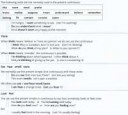Вы видите копию треда, сохраненную 21 февраля 2016 года.
Можете попробовать обновить страницу, чтобы увидеть актуальную версию.
Скачать тред: только с превью, с превью и прикрепленными файлами.
Второй вариант может долго скачиваться. Файлы будут только в живых или недавно утонувших тредах. Подробнее
Если вам полезен архив М.Двача, пожертвуйте на оплату сервера.

Previous thread: >>157475 (OP)
Got any questions about English? Ask them in this thread.
In this thread and this thread only: free translations by clueless beginners and arguments about grammar between native speakers and B1 level experts.
Don't understand the meaning of a word? Just ask your question here, and we'll be happy to give you a link to the related article on http://oxforddictionaries.com or http://merriam-webster.com
Bad at English grammar? Don't want to bore yourself with books? Now you don't have to! Come up with some sentences of your own and post 'em, you'll have high quality /англо/ corrections before you know it.

и [ˈrɪəli] превращается в [ˈrɪələi] или даже в [ˈrɪəlei]
внимание, вопрос - в каком из британских акцентов?
>..it is a moderately wealthy, advanced, and powerful country, but every time I visit, I can't wait to get out and come away feeling depressed.
Почему не I visit it ?
Во многих, на самом деле. В основном в Estuary.
Явление называется happy-tensing.
https://en.wikipedia.org/wiki/Phonological_history_of_English_high_front_vowels#Happy_tensing
Жил с одним в общаге. Хуй понимал, что он там пиздел.
Ну как-то так да. Ещё может быть лондон мультикультурал (теоретически, мне лень проверять прост.) Где слышал?
My opinion on spelling is that the more the student gets familiar with the "correct" way of spelling, the easier it'll be for him to get into reading more challenging texts.
this is one of the rare times I can offer an actual grammatical explanation: because visit can be transitive or intransitive, ie it doesn't have to have an object.
Главный актёр fawlty tower, который ещё в монти пайтон был, вот у него это было.
Pollij!
Ну ещё можно послушать сериал eastenders. Там бейбэй - baby
My mother is ill, can you visit her in the hospital?
My mother is ill, can you visit in the hospital?
I think the second one doesn't make much sense though
Ну так я оттуда и принес первоначальный текст
visit
intr
to make a visit
Получается он имел в виду
...every time I make a visit...
Ну, так я его и загулил, блеат.
Откуда такая вера, что нейтивы говорят и пишут всегда правильно?
Он пришёл на 4чан выругаться. Не ожидай от него какого-то эталона речи.
Просто давно замечаю, если вижу что-то непонятное, но оно написано нейтивом, то там ошибки нет, просто непонятно для лично меня
Зато узнали что визит может быть интранзитив
Thank you
>I wanted to like California, but every time I visit (mostly LA) I end up spending hours stuck in traffic getting places.
https://news.ycombinator.com/item?id=10445854
Нефига не транзитив. Объект должен быть упомянут непосредственно перед этим.
>My dental hygienist is cute. Every time I visit, I eat a whole package of Oreo cookies while waiting in the lobby.
http://www.goodreads.com/quotes/450512-my-dental-hygienist-is-cute-every-time-i-visit-i
Вы, сцука, все тут на гугле забанены?

Конкретно заебать решили?
https://books.google.ch/books?id=k_ZqqaYrftAC&pg=PA119&lpg=PA119&dq=%22every+time+I+visit%22&source=bl&ots=Pae9ehB6nX&sig=ZVUBlFh5HnFMdkO8bCx_I7fohk4&hl=ru&sa=X&ved=0CGMQ6AEwCThQahUKEwib1snkivrIAhVEwBQKHZaUCT8#v=onepage&q=%22every%20time%20I%20visit%22&f=false
every time I visit (her office)
Это подразумевается просто?
Т.е. можно использовать транзитив как интранзитив просто в уме галочку ставя что вот тут я объект додумал, но просто не написал и так поймут?
>Вы, сцука, все тут на гугле забанены?
Нет. А причём тут гугл, ебанашка? Или сейчас запретили делать какие-либо утверждения без ссылки на гугл?
Так уж сложилось™
Да, в контексте понятно, что он не её посещает.
И почему же это моя сцылка, а не твоя?
Твои общие рассуждения о транзитивности полная хуета. Объект должен быть заявлен в контексте, а не просто отсутствовать.
Why do I not have a permanent residence
Выходит второй выпуск еженедельной рубрики Say No To Runglish не выходит, я в рот ебал доказывать правильность каждого пробела перед каким-нибудь очередным долбоёбом-бегиннером.
К тому, что безъобъктный герундий нехуя не доказывает, что глагольная форма может без объекта.
Ты нехуя не понял индид.
Это слова песни:
Is this the way I wanna live?
Trying hard not to miss anything life might give
Or do I keep on running round?
Chasing my tail, never exhale
How come I never settle down?
Will I ever rest my head?
At ease, at peace
And in need of nothing else
I ask of you
Но там ни разу не герундий. Это презент партисипл. И это пример прямо из оксфордского словаря.
>Это презент партисипл
Пример глагола, с которым такой безъобъектный презент партисипл невозможен, мона?
Он по жизни ошибся
А почему бы и нет, всегда ивана рады обоссать
He said that in October it would have been ten years since he (to work) at the factory.

>The Gender of Nouns
>§ 2. In accordance with their meaning nouns my be classed as belonging to the masculine, feminine and neuter gender.
Апофеоз залупняка
Чем же заняться в это прекрасное субботнее утро?
Ok. You is the smart guy here.
ain't that some shit boy huh!
Open a fucking textbook and read it. This shit is usually explained on the first pages.
What. Where is this from?
What the fuck're you saying?
по каким материалам жи, книги/курсы и т.п.

Но почему тут "come"?
Я хочу знать то, подобная конструкция в принципе не используется в разговорной речи, или всё таки её можно встретить?
how come... = как же так получается, что ...?
При этом порядок слов не меняется (никаких how come do you...), только так - How come you don't know about "how come"?
Подождём
Это точно, сэр?
he was hiding
he was drinkin
he was making a move
Она вообще рабочая? Просто звучит как то не так
А что тебя смущает?
Есть два предложения:
Ever since I watched this movie I couldn't stop thinking about it...
Ever since I watched this movie I can't stop thinking about it...
Что меня, собственно, смущает: ever since с настоящим временем не может и не должно никогда быть использовано, а can/can't это настоящая форма, could это прошедшая, само собой. Но если здесь использовать couldn't, то получается, что я не мог перестать думать об этом фильме до какого-то опредленного момента в прошлом и о настоящем положении дел оно ничего нам не сообщает.
Как поступить?
Можно, конечно, заменить couldn't/can't на I haven't been able to stop thinking about it, но не будет ли это звучать несколько коряво?
>there's nothing wrong with either of those
Контекст же нужно учитывать. Я хочу сказать: "с тех пор, как я посмотрел фильм, я не могу перестать думать о нем".
"can't" в этом контексте, мне кажется, был бы лютым рунглишем.
Правило не мое и я ничего не выдумывал. Вот, например:
http://forum.wordreference.com/threads/since-present-simple-correct.1488805/
It was 1976. I watched that movie. I couldn't stop thinking about it.
It is 2015. I watched this movie. I can't stop thinking about it.
Это ты сейчас правило выдумал?
В моем варианте не сообщается когда я смотрел фильм, вчера или двадцать лет назад. Оно и не важно, потому что я его СМОТРЕЛ, это происходило в прошлом и думал я о нем на протяжении какого-то времени. Поэтому я и думаю, что ни один из тех вариантов верным не является. Лучше здесь использовать:
>haven't been able to stop thinking about it
>He generally seemed to care for me and was stroking my hair and kissing it and my head and I had my hands on his chest, and we spoke for a little while. Anyway, that was it and he went back to his room later on. Ever since I can't stop thinking of him in that way. I just seem to really like him, but I don't want to jeopardize our friendship.
Все равно основной смысл не меняется же как ни скажи, хоть кант хоть хавна бин абле
Просто он говорит о том что сейчас происходит я так понимаю
А хавна бин абле подразумевало бы период, но ключевой смысл один и тот же
Для этого даже название было какое-то, когда презент и перфект означают одно и то же в определенных контекстах
I am done/have finished mowing the lawn.
And the haters gonna hate, hate, hate, hate, hate
Baby, I'm just gonna shake, shake, shake, shake, shake
I shake it off, I shake it off
А что этот тут у нас, ага опять объект опустили у транзитива
Не должно ли быть?
I'm just gonna shake it, shake it, shake it, shake it, shake it
Ведь очведино она имеет в виду что
she wants to get rid of something that is on her by shaking
>Можно, конечно, заменить couldn't/can't на I haven't been able to stop thinking about it, но не будет ли это звучать несколько коряво?
Но ведь в предложении I could never master English тебя ничего не смущает, хотя там тоже never - маркер Perfect Tense.
Поздравляю, ты только эллиптические конструкции.
https://en.wikipedia.org/wiki/Ellipsis_%28linguistics%29
Тем более это песня.
Не думал в английском такое есть, ведь тут обоссали кого-то как-то, что он объект случайно опустил, хотя очевидно что он подразумевался и все понятно было и без него
Тут обоссывают даже когда всё правильно, чтобы не зазнавался.
Дополню этого строками, которые взорвут любую мариванну с маркерами
>I ain't as good as I once was
>But I'm as good once as I ever was
Я бы не стал доверять этой статье:
>She persuaded him to do the homework, and he her.
>Should I call you, or you me?
Справедливости ради, там нет про опускание местоимения it в таком контексте, как у тебя, но это блять песня. Они там могут хоть he don't петь, как тот же Linkin Park
С другой стороны, мне непонятно, почему ты считал, что нельзя опускать объект.
Если проводить аналогии с русским, то приходит в голову вот что-то такое:
Я трьсу, трьсу трьсу трьсу,
трьсусь от возмущения
Местные школьники энурезники находят повод обоссаться даже при виде англовики?
Что тебе, собственно, не нравится? Что в школе этого не проходили?
А когда я пытаюсь использовать гэппинг, меня тут же обоссывают местные эксперты.
Did she give him my pen, or you them hers?
Рунглиш ищщщуть.
>>161144
Это такой пассив.
> Yes, you can change "I have been painting the ceiling" into the passive - "The ceiling has been being painted by me". But in so doing you would simply be practicing a mindless exercise, because (except in some unusual circumstances, as described by khoff) nobody talks that way!
>knoff:
>The only context I can think of for this construction is something like this:
>"The museum is closed. The ceiling is being painted."
>"The ceiling has been 'being painted' for six weeks now. How long is it going to take??!!"
>The passive forms of certain of the combinations involving the progressive aspect are quite rare; these include the present perfect progressive (it has been being written), past perfect progressive (it had been being written), future progressive (it will be being written), future perfect progressive (it will have been being written), conditional progressive (it would be being written) and conditional perfect progressive (it would have been being written). Because of the awkwardness of these constructions, they may be paraphrased, for example using the expression in the process of (it has been in the process of being written, it will be in the process of being written, and similar).
Тоже с вики.
>nobody talks that way
>nobody talks that way
>nobody talks that way
>nobody talks that way
>nobody talks that way
because something
This shit works because science, man
She stayed there all night because, you know, love
Dude, you can't. Why? Because police, if you do they gonna get you
Чего батхёртишь? Про ebonics тут сейчас никто не писал.
>>161149
А теперь дочитай пост до конца. Nobody talks that way не означает, что никто вообще никогда так не говорит. И ещё см. >>161146
'cause she gots it against you pal and she ain't stop 'till you get her shit straight
Да я такой
Там очень узкая область употребления. Как и у любого сложного времени (кроме present). Нельзя просто взять и сказать I had fucked your mother, нужна привязка к простому времени (например, she got pregnant).
Да кто спорит-то ёп.
>Because of the awkwardness of these constructions, they may be paraphrased, for example using the expression in the process of (it has been in the process of being written, it will be in the process of being written, and similar).
>may be paraphrased
Мне вот эта няша понравилась:
>conditional perfect progressive (it would have been being written)
А вообще часто доводилось слышать, что русские переусложняют грамматику, с точки зрения избыточных конструкций, так что мб нам вредно такое использовать.
Ты из гугла пример выдернул? Ну, спешу тебя разочаровать, носители языка тоже делают грамматические ошибки и используют неверную конструкцию/время.
>Все равно основной смысл не меняется же как ни скажи
Смысл, может быть, не меняется, но какой из этих двух вариантов правильный? Оба? Почему? Где такое правило? Я вот сейчас гугл сломаю, ничего содержательного не могу найти, никакого правила.
>Для этого даже название было какое-то, когда презент и перфект означают одно и то же в определенных контекстах
>I am done
>I can't stop thinking about it
Это разные вещи. I am/it is/etc + past participle verb обозначает состояние объекта и к моему вопросу вообще не имеет никакого отношения.
I needn't have done it but I did
В чем разница?
Смысловой глагол
Модальный глагол
Первый вариант менее формальный. На этом разница в этом конкретнром случае заканчивается, хотя я вообще не уверен, что второй вариант грамматически правильный, потому что
> !! need not means that it is not necessary to do something. Do not use it to mean must not (=are not allowed to) : You needn't take any money. | You mustn't take any sharp objects on the plane.
>!! needn't have means that it was not necessary for someone to do something that they in fact did. Do not use it to mean didn't need to or didn't have to (= something was not necessary) : We needn't have ordered so much food. | I didn't need OR didn't have to tell him who I was - he already knew.
>1) I needn't have done it but I did
Вообще твой пример 1) бредовый, похоже на то, что кто-то тупо переделал пример из
2) >I didn't need to have done it but I did
В итоге получается
1) Я не должен был этого делать, я это сделал, но я это сделал (два раза)
2) Я не должен был этого сделать и не сделал этого, но я сделал это (противоречие)
Вот тебе конкретный пример разницы этих конструкций:
>I didn't need to buy a dictionary, but I did.
>I didn't need to buy a dictionary, so I didn't.
>>161187
Ну я же не просил переводить или какие-то анальные термины из залупняка выписывать.
Просто бы прошли мимо если не в курсе.
Generally, they mean the same thing yet "needn't have" might sound stilted
I didn't need to have called the police
I needn't have called the police
These both above strongly "'suggest" that I did call the police.
But they don't say for sure that I called the police. They just mean that I did not need to be "in a state of having called them."
Personally, I would say "I didn't need to call the police" even though it doesn't state whether the action took place or not. In this case you'd need to go more by the context of each particular sentence you are getting to grips with.
I didn't need to call the police because my neighbor already called them. (I didn't)
I didn't need to call/needn't have called the police, but that bum looked so fishy that I did. (I did)
Пиздец ты манька.
Не булькай, манька. Найди себя в чём-нибудь другом.
Смотрю один бриташкинский сериал для изучающих английский (Экстра. Пока несложно, но я лишь на третьей серии. Обещают использовать 3к слов). В сериале один маменькин сынок очень любил поезда. И в Теории большого взрыва Шелдон тоже любил поезда.
Возник вопрос. В англоговорящем мире любить поезда зашквар и этим занимаются люди не от мира сего? Что-то уровня пониебов в Рассеюшке? Чому так, безобидное же увлечение.
И вообще, что подразумевается под "Я люблю поезда"? Просто приходить на вокзал и смотреть их?
A Russian Metrojet airliner bound for Russia crashed and killed all 224 people onboard 20 minutes after leaving Sharm el-Sheikh airport.
The Metrojet A-321 crash happened on October 31, killing 224 people on board.
ну мб просто рейлфан.
залуркай ьранспортные фанаты на лурке. разные типажи бывают но чудаков много
> In primary school classes are composed of about the 20 students.
Всё правильно?

Пойти в школу . ЛОЛ
Мне кажется, это разные части речи.
onboard - прилагательное
on board - существительное с предлогом
А значения у них близкие.
Никак. Тут нет никаких методов "сбросить вес за 10 секунд" и "стать миллионером за час", просто ничего не бывает, везде нужно прилагать усилия, нужно время, терпение, желание учиться, выучить и говорить на языке. Если этого у тебя нет, то никак. Стоя на одном месте никуда не дойдешь.
>везде нужно прилагать усилия, нужно время, терпение, желание учиться, выучить и говорить на языке
Я годами ни с кем не разговариваю (если разговоры с кассиршей "вам пакет? - нет не надо" не считать) и уже нихуя не флюэнт в устном русском, но зачем-то лезу ещё в английский. Что делать?
А зачем он тебе нужен? Определесь, задай себе вопрос: "для каких целей мне нужен этот язык?"
Чтобы смотреть и понимать фильмы? Чтобы читать книжки и понимать их? Чтобы общаться в интернете, понимать, что пишут и уметь писать грамотно и красиво? - это все разные уровни английского. У меня вот, например, совсем плохо с восприятием устной речи, особенно если человек говорит с британским, австралийским или шотландским акцентом, потому что я в своем изучении не фокусировался на речи никогда. Определись с тем, зачем тебе он нужен, и работай в том направлении, задрачивай упражнения.
Я хочу сказать "Теперь мне все понятно".
Вот разные предложения, которые пришли мне в голову:
It's all clear to me now.
I understand it all now.
I see it all now.
Какое/какие из этих предложений нежелательно употреблять? Какие являются правильными, а какие нет? Можно ли использовать их все в данной ситуации?
Спасибо.
>It's all clear to me now.
>I understand it all now.
>I see it all now.
И так, и так можно. Чаще говорят now I get it / now I see.
Рунглиш же.
Какой будет верный эквивалент этой фразы в английском?
We don't say that in English?
Мы в 16-м веке, чтобы использовать такие помпезные конструкции?
Мое предложение:
I don't think you should use that (construction). It's ungrammatical/incorrect.
Как вам?
>>161411
Что ты выебываешься? Очевидно, что это калька не с русского, а русский перевод фразы - калька с английского. Как это отменяет тот факт, что автоматически переведенные фразы на английский - рунглиш? Это, допустим, если бы мы переводили с какого-нибудь близкого к английскому европейского языка фразы, то они были бы точн в 60-70 случаях из 100, но русский далек от английского, поэтому у нас такое прокатывает не часто.
Везде рунглиш! Даже в рэпе (хотя откуда там было взяться русскому?)
You under pressure, in tag no doubt catcher
The snitch-snatcher, shooken with asthma, you casper
You yell my name, that's only giving me props
Plus the fans that you got wondering what's got you hot
It's too not, knocked out the box and got rocked
Got raped on the Island, you officially got
Калька с русского настолько очевидная, что я даже не буду её здесь писать.
Ты можешь эту мантру повторять сколько угодно, но правильнее твои предложения от этого не станут.
Это с англофорума https://www.englishforums.com/English/TheCeilingBeingPainted/bvmdz/post.htm
Подставляй ротик, сейчас будет жур-жур.
я просто вроде слышал, что нужно что то в стиле "i was thinking when you called me"
тру детектив?
>англофорума
И что теперь? На англофорумах не носителей языка, которые тоже допускают ошибки, не сидит? Сидит и в больших количествах.
Хуй с тобой, думай что хочешь. Тебе повезло, что фраза не моя, иначе бы я просто так с тебя не слез.
thinking можно использовать в континиусе, если это означает сам процесс размышлений, а не мнение:
I'm thinking about you. / I'm thinking of going to America. - CORRECT
I'm thinking you're a faggot - INCORRECT (only "I think")
starving бывает прилагательным, так что ни о каком континиусе речи не идёт.
Да просто даунята путают общеязыковые процессы, протекающие почти во всех индоеврпоейских языках, типа элизии с рунглишем. Это что-то типа ебанутой гиперкоррекции.
>калька на кальке и калькой погоняет
>прикрываться общеязыковыми процессами
Уриною окропил уста твои.
Это апельсиновый сок!
Максим
Блядь, да хули вы тут устроили. Вот прям хоть моче жалуйся, что ли. Был же нормальный тред когда-то.
Инглиш деградирует.
обычно слышно man nobody talks like that
Извольте помочь.
>кидзез
Это что за покемон? С чего ты взял, что должно что-то добавиться? Произношение останется тем же.
Зашел на форум
> EFL
> English as a Foreign Language
> Английский как иностранный язык
Что за говно ты мне подсовываешь, ебанутый? Этот форум Семочка из 6 /б/ делал? Чому такой рунглиш?
Все жопа горит? Таблеточки прими, буйный школьник.
Stupid hobbitses, tricksy hobbitses, always keeping it from us... yes, my precious. We wants it!
onboard = бортовых (в русском языке у этого слово несколько смещенный смысл)
on board = на борту
you're full of shit
>>161422
>>161401
so are you
>>161535
there's no change in pronunciation for kids. There is for some other words that are singular like "Charles's" is pronounced Charleziz. I think you can assume that a plural ending in s will have no change in pronunciation in the possessive, but a singular one that ends in s usually will. Venus's, Vesuvius's, etc.
>>161367
>>161567
you're right. The "...killed all 224 people onboard..." is a typo and should be on board.
Onboard is typically used to describe something on a vehicle, usually a boat or plane but not limited to those kind of vehicles.
>Even some small planes have onboard computers nowadays.
Ifan pls

>твою спидозную мамашу следует закидать камнями и скормить гиенам
Your aidsy mom must be stoned to death and fed to hyenas
И ещё, как сказать "хуеглотина ты пропидоренная"? Из ругани ничего кроме фака и щета не знаю.
>Можно ли так сказать?
Ты разрешения спрашиваешь?
Смущает только aidsy.
>хуеглотина ты пропидоренная
cockswallowing faggot
Почему who, a не where?
Чего хотел-то?
>вопрос
Никакого вопроса не вижу
>>161619
>aidsy
aids ridden
>>161612
>аунтабле/анкаунтабле
If it's an English term write it in English. I had trouble figuring out what the fuck you were trying to say. The answer is we instinctively know based on a lifetime of hearing the words used in context. Even an uneducated native speaker will, outside of any dialectical odditied, properly use a noun. You as a learner have to memorize them, but lucky for you uncountable nouns all share characteristics. They're usually concepts or abstract things, or words that refer to groups like furniture. The same thing applies to transitive/intransitive verbs. There is no way to tell by looking at it, we just know it instinctively just like you guys know the aspect of a verb.

О, форсер, смотри, человек учит английский с шести лет. Это хорошо? Или уже поздно?
Спасибо. Если никто ошибки не найдёт завтра так и перепишу в чистовик.
"From September to May inclusively" should be part of the previous sentence.
4 terms of different durations
>no uniforms but the business style of dress is compulsory
"There's no school uniform, but business attire is compulsory"
>Primary school lasts for nine years and higher school yet two years
Google translate?
>Primary school lasts nine years and high school lasts two.
but a better way to say it is
>Students attend primary school for nine years and high school for two
>higher school
it's always high school. "Higher education" refers to university and beyond.
>classes are size..
"class sizes are around 10-15 students"
>in belarus schools
In Belarussian schools or in schools in Belarus or just in Belarus. Since you use the word "students" it's kinda implied that they do their studying in schools.
>Russian, Belarus, and English languages
"Russian, Belarussian, and English languages..." or just "Russian, Belarussian, English,..." since it's implied that you're referring to the languages
>Maths
math, don't use the British short form since they're bad at it anyway. :^)
>reading
you don't study reading. You can learn how to read, but that's kinda a given since you're studying the local languages in school. A better word would be literature if you're referring to reading famous novels and stuff like that.
>and physical education
you also don't really study pe. a better way to end the sentence would be something like:
"..., and take physical education classes.
"From September to May inclusively" should be part of the previous sentence.
4 terms of different durations
>no uniforms but the business style of dress is compulsory
"There's no school uniform, but business attire is compulsory"
>Primary school lasts for nine years and higher school yet two years
Google translate?
>Primary school lasts nine years and high school lasts two.
but a better way to say it is
>Students attend primary school for nine years and high school for two
>higher school
it's always high school. "Higher education" refers to university and beyond.
>classes are size..
"class sizes are around 10-15 students"
>in belarus schools
In Belarussian schools or in schools in Belarus or just in Belarus. Since you use the word "students" it's kinda implied that they do their studying in schools.
>Russian, Belarus, and English languages
"Russian, Belarussian, and English languages..." or just "Russian, Belarussian, English,..." since it's implied that you're referring to the languages
>Maths
math, don't use the British short form since they're bad at it anyway. :^)
>reading
you don't study reading. You can learn how to read, but that's kinda a given since you're studying the local languages in school. A better word would be literature if you're referring to reading famous novels and stuff like that.
>and physical education
you also don't really study pe. a better way to end the sentence would be something like:
"..., and take physical education classes.
The school year in Belarus runs September through May.
It is divided into quarters that last about two to three months each.
The school day starts at 8:00 and finishes at 14:00.
Generally, you do not have to wear a school uniform here, but there is a business style dress code in place for all the students which should be adhered to at all times and should be worn with pride.
In most schools, education is divided into two levels: primary school and middle school.
The former lasts four years, and the latter runs for seven, respectively.
Primary school classes are made up of about twelve students, and those of middle school comprise ten to fifteen students.
In order for us to succeed, we are obliged to study many subjects in school: Russian, Belorussian and English languages, mathemathics, physics, Russian literature, natural and computer sciences, history, physical education, etc.
My favorite teacher is Ms. Marijuanna, she teach us English and she does it good, as you can see.
At the end of both elementary and middle cycles, governmental examinations are compulsory for all schools.
The school year in Belarus runs 9 months from September to May inclusively. The school year is divided into 4 terms of different durations. The school day runs from 8 a.m. to 2 p.m. There's no school uniform, but business attire is desirable. But if you wear loose clothes, nothing terrible will happen. Students attend primary school for 9 years and high school for 2. In primary school classes are composed of about 20 students. In high school class sizes are around 10-15 students. At the end of primary and high school students take exams. In Belarussian schools students study Russian, Belarussian, English, Maths, Reading, Natural sciences and Physical education.
Так лучше? Школьные предметы на менял т.к. такие же стоят в примерах. Но в разных примерах по разному описаны. Может вместо students study написать students in Belarus study academic subjects, such as?

>My favorite teacher is Ms. Marijuanna, she teach us English and she does it good, as you can see.
и хай скул у нас нет, только начальная и средняя, по крайней мере раньше так было
>The former lasts four years, and the latter runs for seven, respectively.
you don't need respectively here because the use of former and latter removes any possible ambiguity. A proper use of respectively would be:
"Primary and middle school last four and seven years, respectively."
>My favorite teacher is Ms. Marijuanna, she teach us English and she does it good, as you can see.
She teach us English an she do it gud, nawmean?
A lot of your fixes are just a bit wordy, like
>At the end of both elementary and middle cycles, governmental examinations are compulsory for all schools.
Good English writing is concise and written in proper style. There's no reason not to just write this as
"Students take national exams at the end of primary and high school."
you could also refer to them as standardized tests/exams as that will be the phrase most familiar to an English speaking audience.
in effect
my german is awful but here goes
wenn er benoetigt die Uebersetzung, dann gebe ich sie ihm.
>>161742
ну он сам higher school написал. так что корректовал на high school. начальная и средняя тогда будут наверно elementary and middle school. Сколько лет выпускникам школы в беларусе? Проблема в том, что надо выбрать перевод наиболее подходящий к нашему понятию elementary/middle/high school, вне зависимости от дословного перевода.
кстати, как правильно: вне зависимости от чего-нибудь, не в зависимости от чего-нибудь, или в независимости от чего-нибудь. считаю что третий вариант о независимости в смысле freedom, то есть "не в рабстве".
> не в зависимости от чего-нибудь
Это подразумевает:
не а зависимости от чего-нибудь, а от того-то и того-то
То есть противопоставление. И вообще non colloquial
>в независимости от чего-нибудь
В независимости Украины от России есть как плюсы, так и минусы.
The independence of Lithuania from Russia has both its advantages and disadvantages for our countries.
>>161761
>вне зависимости от чего-нибудь
Вне зависимости от того, придёшь ты, или нет — я буду ждать тебя.
Regardless of whether you come or not I'll be waiting for you.
Whatever the circumstances we must try and do our best to meet the deadline.
Вне зависимости от обстоятельств мы должны стараться изо всех сил, чтобы успеть к сроку (до дедлайна).
note that this borrowing may not have been introduced in the dictionaries
>> не в зависимости от чего-нибудь
Lemme elaborate:
-В зависимости от того, получу ли я заказ или нет, я сообщу вам.
-Не "в зависимости", а обязательно!
So it's only used in such emphatic structures, when the speaker B alters the message of the speaker A to stress his ... dunno indignation?
ДАВАЙТЕ ПИЗДЕТЬ НА АНГЛИЙСКОМ
Не могу перевести предложение "We can't seem to get enough about kids these days and just how different and awesome it was to be a kid back in the good old days."
Особенно подчеркнутое. И как связать это со второй частью, тоже непонятно.
google.com to get enough about site:thefreedictionary.com клац
Вообще если по чесному, похоже на очепятку, забытый при написании/переписывании глагол или существительное.
>Кажется, мы слишком любим тему современных детей и того, как раньше все было по-другому, как было круто быть ребенком в старые добрые времена.
Короче, в наши-то времена о-о-о-о-о, а сейчас все сидять за компуктерами да слепнуть.
Я по смыслу все понял, спасибо. Мне нужен литературный перевод.
И первая часть мне кажется значит "мы не можем понять до конца детей".
>И первая часть мне кажется значит "мы не можем понять до конца детей"
Нет. Даже будь это двумя разными предложениями, а не одним.
The school year in Belarus runs nine months from September through May. It is divided into quarters that last about two to three months each. The school day starts at eight a.m. and finishes at two p.m.. Generally, you do not have to wear a school uniform here, but there is a business style. But if you wear loose clothes, nothing terrible will happen. In Belarusian schools, education is divided into two levels: primary school and high school. Primary and high school last nine and two years, respectively. Primary school classes are made up of about twenty students. In high school classes consist of teen-fifteen students. Students take national exams at the end of primary and high school. In order for us to succeed, we have to study many subjects in school: Russian, Belarusian and English languages, mathematics, physics, literature, natural and computer sciences, history, physical education, etc.
"вне зависимости от чего-нибудь" это полный аналог "no matter something"
Я всегда делаю свою работу, вне зависимости от погоды.
I always do my job, no matter the weather.
"не в зависимости от чего-нибудь" это что-то типа "not because of something/depend not on something"
Хамелеоны меняют свой цвет не в зависимости от окружающей среды, а просто потому что они сами так хотят.
Chameleons change their color not because of the environment, but because they just want to.
Changes in a chameleon's skin color depend not on the environment, but on its own will.
"в независимости от чего-нибудь" если я правильно понял что-то типа:
Многие подростки нуждаются в независимости от родителей.
Many adolescents seek to be free of their parents.
Many adolescents need freedom instead of control.
>The sheer number of articles and papers and internet posts published daily comparing then and now both sincerely and ironically is astonishing. We can't seem to get enough about kids these days and just how different and awesome it was to be a kid back in the good old days.
С контекстом даже очевиднее, что это переводится именно так, как я сказал.
Да, типа того. Темой о детях и том, что раньше все было иначе.

> from September through May
Я не знаю можно ли эти смешивать (пик)
Обычно говорят или "from ... until/to" либо "... through ..."
>but there is a business style. But if you wear loose clothes
Перепиши как-нибудь чтобы but не повторялся рядом
А это ахуенное же что зря писал что ли:
>Generally, you do not have to wear a school uniform here, but there is a business style dress code in place for all the students which should be adhered to at all times and should be worn with pride. Although if you wear loose clothes, nothing terrible will happen.
>Primary and middle school last four and seven years, respectively.
Isn't it "Primary and middle schools..." ?
Посмотрел примеры употребления в интернетах в интернетах, подойдет перевод "Всё для чего-то конкретного". Но фраза про яйца так не переведется.
Контекст: некто поставил вариться яйца и свалил из дома, когда вернулись, вся квартира уже неплохо продымилась.
Is anyone up for very hard boiled eggs
>Обычно говорят или "from ... until/to" либо "... through ..."
Понял. Напишу from/to.
>А это ахуенное же что зря писал что ли:
Да. Так лучше. В предыдущем варианте 2 предложения по смыслу не считались поэтому укоротил первое. Так и напишу.
Спасибо.
Может лучше написать так? It is divided into four quarters that last about two to three months each.
quarter
ˈkwôrdər/
noun
noun: quarter; plural noun: quarters
1.
each of four equal or corresponding parts into which something is or can be divided.
It is divided into four equal or corresponding parts that
It is divided into four four equal or corresponding parts that
Что-то мне подсказывает что слово quarters уже включает в себя значение "четыре"
four terms тогда уж
I've i have spoken about red car

Ну это divided into quarters уже подразумевает что что-то поделено на 4 части
Вон даже картинки гуглятся
Спасибо, няша.
not unless you're talking about specific schools. When you talk about school as an idea or concept or just about pre-university education in general, it's pretty much always singular. Here are some examples of when it's not:
><County> (a subregion in a state) elementary and middle schools are terribly underfunded and plagued by truancy.
>The gap between well funded and poor school systems is being widened by wealthy school districts' ability to integrate technology into the classroom.
>>161788
>>161767
>>161765
спасибо
>>161804
>А это ахуенное же что зря писал что ли
>ахуенное
I already pointed out the issues with that sentence.
kek I just realized I reworded that second sentence and completely failed to use schools in the plural.
>Well funded schools are able to introduce their students to technology that is prohibitively expensive to poorer districts.
фикс
>Well funded schools are able to introduce their students to technology that is prohibitively expensive to poorer districts.
Ты ведь в курсе, что такая калька не Беларусь не распространяется? Школа в "бедном районе" не финансируется силами "бедного района". У школы могут быть шефы в виде крупного производства, те могут подбросить на компьютеры, но новую дисциплину как программирование 3D игр с преподаванием на английском они в учебный план не вставят.
Похвально, что ты хочешь ему помочь. Но это как вытаскивать сочинение семикласника на уровень кандидатской по филологии. "Доктора философии" смотрел?
>Я твоих детей ебучих найду и сожгу, а тебе пришлю что осталось
I'm going to find and burn your fucking children, and send you what (to remain) of them!
remained? would remain? Или, прости Господи, will remain?
костыль send you the remains не предлагать
Watch out for your kids! I'll hunt them down and burn them (to ashes). I'll send you what's left by registered mail.
What the fuck are you talking about? Those sentences are just examples of when school is used in the plural. Whether or not they apply to Belarus has literally no bearing on anything. Those posts aren't even directed at the "hi 2ch fix my homework" guy.
>>161884
what remains of them
>What the fuck are you talking about?
What the fuck did you just fucking say about me, you little bitch? I’ll have you know I graduated top of my class in the Navy Seals, and I’ve been involved in numerous secret raids on Al-Quaeda, and I have over 300 confirmed kills. I am trained in gorilla warfare and I’m the top sniper in the entire US armed forces. You are nothing to me but just another target. I will wipe you the fuck out with precision the likes of which has never been seen before on this Earth, mark my fucking words. You think you can get away with saying that shit to me over the Internet? Think again, fucker. As we speak I am contacting my secret network of spies across the USA and your IP is being traced right now so you better prepare for the storm, maggot. The storm that wipes out the pathetic little thing you call your life. You’re fucking dead, kid. I can be anywhere, anytime, and I can kill you in over seven hundred ways, and that’s just with my bare hands. Not only am I extensively trained in unarmed combat, but I have access to the entire arsenal of the United States Marine Corps and I will use it to its full extent to wipe your miserable ass off the face of the continent, you little shit. If only you could have known what unholy retribution your little “clever” comment was about to bring down upon you, maybe you would have held your fucking tongue. But you couldn’t, you didn’t, and now you’re paying the price, you goddamn idiot. I will shit fury all over you and you will drown in it. You’re fucking dead, kiddo.

Fuck yeah!
Верно, не?
"The Smiths"
Not sure what you mean but I hope it is one of these
The Smiths have to handle their still living off them son
The Smiths have to handle their son who keeps getting money from them

I live off my parents
Does anybody have friends who live off their parents?
I am a person still living off my parents
And your parents, do they have to do something about their still living off them son?
Yes, they have to deal with me because I am their still living off them son
They have to handle their still living off them son
>I didn't choose to be back here in my parents' pub, with my as good as useless brother still living off them.
The Smiths have to handle their ugly son
The Smiths have to handle their useless son
The Smiths have to handle their useless, still living off them son
The Smiths have to handle their still living off them son
Me Ivan do not understand what is wrong about those above
An adjective phrase is a group of words that describe a noun or pronoun in a sentence. The adjective phrase can be placed before, or after, the noun or pronoun in the sentence.
Cowboys riding into the sunset were in the final scenes of many movies
She was proud of her winning the science fair son
The Smiths have to handle their still living off them son

>Overall the entire construction is a bit awkward.
I tried to rewrite a phrase from AJ Hoge course:
>I have also dealt with him taking women to hotels.
- Hoge notes that "to deal with" can be replaced by "to handle".
- And i'm trying to tell about parents who has an adult son and that son still asks them for money (maybe he doesn't want to work, maybe something else).
> He's invited me to dinner tonight
Котаны, зачем тут "Has"? В чем тогда отличие от "He invited me to dinner tonight".
Вроде же просто факт, пригласил поужинать.
Тне позвонил ее начальник, сразу после звонка она хвастается своей соседке по квартире: "That was Howard. He's invited me to dinner tonight".
the first sentence is correct, the two others are not.
You can't cram an adjective phrase in between a possessive noun and the noun itself. Putting it after the noun however makes the sentence sound okay:
She was proud of her son winning the science fair
The Smiths have to handle their son still living off them
>a possessive pronoun
>>161940
ye pretty much what >>161967 said. you can also say "son's" and then follow with the phrase.
>>161955
you could also say "The Smiths need to get a handle on..."
>>161958
there's no particular reason for the "he's." You could convey pretty much the same information with just "he invited" or "he just invited." I think brits tend to use "has verbed" more as I personally wouldn't ever say it unless I really wanted to emphasize that something happened contrary to what the listener thinks:
>You didn't take out the trash!
>but I HAVE taken out the trash!
although I did take out/I took out can be used in that sort of context just as well.

Все равно не понимаю
Если оно работает как аджектив, то его и ставить можно в те места где может быть аджектив
their ugly son
my tremendously long sentence
their still living with them son
>still living with
are you sure this is an adjective? Looks pretty much like a gerund which you can only put after the noun.
>winning the science fair
here "winning" is certainly a gerund since no adjectives can be connected to another word without a preposition.
If you honestly can't see the differences between those three examples you just wrote then you need to go get your grammar on. After about 30 seconds of googlin' I think what we're dealing with here is an attributive verb. There are restrictions on where those can be placed in English according to the type of attributive verb, and I'm not entirely clear on the rules. I can, however, tell you that at least one of them forbids the case of your examples like "their still living with them son" just because I'm a native speaker and I've never heard a construction like that in my entire life. It reminds me of a phrase with one of the -ющий verbal adjective things in Russian.
>arguments about grammar between native speakers and B1 level expert
Either
I don't give a fuck, not even a flying one.
I won't fuck anybody, not even your oozing mother.
Мне понадобилось 10 лет, чтобы понять это.
Что ещё? Давайте, шокируйте меня. про спряжение behave уже знаю
Вроде посыл твоего поста прост, а так пытаешься замудрить. Вся суть не нейтивов.
don't you start it again, Ivan. I'm not going to prove I'm american yet again.
К even же. Этого я никак не ожидал
Half of this thread would give their anal virginity for being a "stupid ass from Jersey."
Спасибо, братишка. В этом
> brits tend to use "has verbed"
вся суть.
Разве лишь я думал, что если я смотрю образовательный сериал, то все должно быть без подобных косяков и неукоснительно следовать грамматике. А там "has V3" без надобности, "gonna", "wanna", вопросы без вспомогательных глаголов и прочая гадость. Марьиванна будет недовольна. Скажет, что это не английский, а язык мигрантов с брайтон бич.

Ищу желающих поговорить на английском, у которых примерно та же ситуация, что и у yours truly( +-Advanced, недостаток практики общения при относительно большом к-ве потребляемой на инглише информации - фильмы, книги, интернеты. Ну и некоторый дискомфорт при разговоре с незнакомцами, само собой)
Тян ты, кун, андрогин, сисси, трайджендер, да хоть Аллах или школьник - мне всё равно.
Добавляйтесь и пишите, думаю, имеет смысл сначала обсудить темы для разговора, чтоб не тупить в процессе. кому я вру, мы точно будем тупить
Skype: john.doe.1488
inb4 социоблядь
That guy isn't me :^)
>>162012
This "You're clearly not a native speaker" meme never gets old. Keep on keepin on, Ivan. I know I'm feeding the trolls but I'm still waiting on a post that actually points out what the poster thinks are "signs" of my nonnativeness, if that's even a word.
>>162058
A good educational program SHOULD include that kind of stuff. Language is not the static sterile stuff you see in instructional texts, you need to hear how natives actually talk
>>161958
Экстру чтоли смотришь? В ней всё нормативно, это мёрриканцы размывают разницу между паст симпл и презент перфект.
Ее. Первые серии вообще труда не вызывали, в каждой фразе слышал все слова. А в пятой внезапно многое не понял. Значение фразы-то очевидно, но вот каждое слово расслышать не получается.
Надеюсь, дальше будет сложнее и после просмотра я смогу весьма неплохо понимать уже полноценные сериалы (Футураму пробовал. Могу лишь если заранее ознакомиться с транскрипцией. Сложных слов там нет, но говорят очень скомкано).
Благодарю.
"When i was go school?"
второй случай, только to не забывай, дружок
Как на русском вопрос звучит?

So John do you feel like an interview?
If you do, vocaroo your answers, please, with pauses between the answers.
This is for my University project.
I hope you will get around to answering the questions, your help will be greatly appreciated.
—Toinght we have our special guest John. He is from Atlanta (Georgia, the US). Hello John.
—Hello Ivan, thanks for having me.
—So John
1. You said you visited Russia not long ago (or maybe long ago) and you lived there for a year, or something like that, as a student. What did you study and, from the point of view of an American, what is your take on Russian system of higher education?
2. About foreign language teaching in Russia and that in the CIS in general. There are so many complaints nowadays about how bad this system is, that they adhere to "Soviet methods" of teaching, which were focused more on reading and translating than actual developing a student's communication skills. Although, in American and British language schools, the communicative approach to teaching foreign languages is very fashionable. So what was your first experience of talking to a Russian person like, and do you think the Soviet methods of teaching foreign languages really work?
3. About that constant American—British controversy thing. As you may know, here in CIS, historically, teachers for some weird reason are inclined to teach British English (yet they teach Russian English). But Bryan Garner (an American lawyer, lexicographer, and teacher) wrote, in his book "Modern American Usage," that "During the mid-20th century, the English language's center of gravity shifted from England to the United States." Do you agree with him? What do you think, these days British English still plays any important role when it comes to international communication, or most people (including famous British actors like Hew Lorry, for example) are trying to keep up and on with the standardized, up-to-date and generally accepted as the most favorable American version of the language?
4. What do you think about outdated "soviet" educational materials (books, etc.) that are still in use in CIS universities today? Is it possible for a foreign language student to learn something useful from them? As far as I know, phrases like for example "was the mailman here yet?" or "did you do your homework yet" are totally acceptable in American English but from the point of view of "Soviet English," which they teach you in CIS, it's a no-no thing and they will lower your exam score if you use something like that.
5. Is it true that American English is easier for learners than the British one?
6. What can you say about the average Russian English teacher? Did you know that the majority of Russian English teachers are pretty young girls aged around 23-25?
7. Can you please say something in Russian for our listeners as a conclusion?

So John do you feel like an interview?
If you do, vocaroo your answers, please, with pauses between the answers.
This is for my University project.
I hope you will get around to answering the questions, your help will be greatly appreciated.
—Toinght we have our special guest John. He is from Atlanta (Georgia, the US). Hello John.
—Hello Ivan, thanks for having me.
—So John
1. You said you visited Russia not long ago (or maybe long ago) and you lived there for a year, or something like that, as a student. What did you study and, from the point of view of an American, what is your take on Russian system of higher education?
2. About foreign language teaching in Russia and that in the CIS in general. There are so many complaints nowadays about how bad this system is, that they adhere to "Soviet methods" of teaching, which were focused more on reading and translating than actual developing a student's communication skills. Although, in American and British language schools, the communicative approach to teaching foreign languages is very fashionable. So what was your first experience of talking to a Russian person like, and do you think the Soviet methods of teaching foreign languages really work?
3. About that constant American—British controversy thing. As you may know, here in CIS, historically, teachers for some weird reason are inclined to teach British English (yet they teach Russian English). But Bryan Garner (an American lawyer, lexicographer, and teacher) wrote, in his book "Modern American Usage," that "During the mid-20th century, the English language's center of gravity shifted from England to the United States." Do you agree with him? What do you think, these days British English still plays any important role when it comes to international communication, or most people (including famous British actors like Hew Lorry, for example) are trying to keep up and on with the standardized, up-to-date and generally accepted as the most favorable American version of the language?
4. What do you think about outdated "soviet" educational materials (books, etc.) that are still in use in CIS universities today? Is it possible for a foreign language student to learn something useful from them? As far as I know, phrases like for example "was the mailman here yet?" or "did you do your homework yet" are totally acceptable in American English but from the point of view of "Soviet English," which they teach you in CIS, it's a no-no thing and they will lower your exam score if you use something like that.
5. Is it true that American English is easier for learners than the British one?
6. What can you say about the average Russian English teacher? Did you know that the majority of Russian English teachers are pretty young girls aged around 23-25?
7. Can you please say something in Russian for our listeners as a conclusion?
That's Hew Truck in American.
I happen to have some free time tonight, so I can answer your questions when I get home. Before I do, what will the recordings be used for and what's the aim of your project?
It is for internal use only.
It is going to be looking like some kind of radio interview. I will record my written questions and then mix them with your answers (this is why I need the answers to be separated by pauses). After that I think I will add an ambient sound and a couple of rounds of applause so it can sound like a real interview. If you want, I could upload it for you after it is done.
The project is mostly aimed at criticising the way they teach foreign languages here.
They use outdated educational materials that were written by some Russian Ivan in maybe 1974 or something like that, and they force students into doing writing activities most of the time instead of speech practicing. And overall they teach students something that has little to do with real English. Because of that, our students can hardly talk in English and when they do, they do that very badly, with a terrible accent.
Moreover, CIS students are indoctrinated that there's only one "correct" version of English, British English, not the American one. Yet in fact it is vice versa. Obviously, the influence of American English is predominant today. I think you can prove that.
And also our girls will be like "wow a real American guy that's cool!"
Ask him if he knows something about professor Zaloopniaque and his methods.
Что ты имеешь в виду? Я бы сказал 'I'm constantly trying to find something novel and exciting in mundane.' Но это совершенно точно не единственный возможный перевод, и вряд ли лучший. В частности я целиком упустил часть перед тире.
Можно еще things добавить в конце.
in the mundane
Ну зачем тавтология?
Скажи special in ordinary, если мое не нравится. Mundane тоже хорошее слово, обозначает всю приземленную бытовуху.
Спасибо, твой вариант лучше передает изначальный посыл, хотя вот это с претензией на красивый слог тоже понравилось
...I'm constantly in search for extraordinary in ordinary.
Вот такой конечный вариант получился. Что тавтология так изначально и задумал, еще на русском. mundane какраз и не подходит потому что больше к бытовому и приземленому, в контекст сочиненя не вписывается.

WHERE ARE YOOOOOOOOUUUUUUUUUU
А при чем тут произношение? Мы вообще-то письменно тут общаемся. Ещё скажи что Leigh, Lee и Li это одна фамилия.
Ты видишь меня, взгляд потерянный, глаза красные-красные — I've been studying all night, you know.
I was going to the cinema when I met Linda.
Has been включает момент речи, was это когда-то в прошлом. Прошлое может быть указано словом ago, то есть если ты указываешь I came 5 minutes ago — то это однозначно Past.
Если же ты говоришь я только что пришёл — I've just come, то это включает настоящий момент, потому что слово just принадлежит настоящему, так сказать, понимаешь?
Но есть исключение, just now, который почему-то идёт с прошедшим временем.
I drank the coffee just now.
В общем разница между ними лежит сразу в нескольких плоскостях, поэтому на одном примере сложно тебе объяснить.
Короче если идти по параметрам:
was -ing
-относится к прошлому
-описывает незаконченное действие-фон (I was drinking coffee when the telephone rang)
has been
-относится к настоящему, то есть действие не окончилось (I've always wanted to visit Paris) (ты продолжаешь хотеть)
может описывать оконченное действие, например I've been running (это когда ты заходишь в комнату весь в поту, и бежал ты -только что, и все видят, что ты бежал только что). Фишка в том, что хоть действие и закончено, его результат настолько очевиден и действие закончилось настолько недавно, что оно ещё не ушло в Past, а является частью Present, поэтому have been.
В общем мне лень перепечатывать по памяти все прочитанные учебники и примеры, задавай вопросы, если что-то конкретное непонятно.
Почему action без артикля?
спасибо, ну я понимаю некоторое, но путаюсь и забываю.
>>162429
у меня так то много вопросов было по этим моментам, но , как обычно, когда нужно я всё забыл.
В чем отличие ISIS was made by the U.S. vs ISIS has been made by the U.S.?
Потому что abstract notion, like love, hatred etc. Google it.
https://english.stackexchange.com/questions/104023/use-or-non-use-of-articles-before-abstract-nouns
>>162434
Действие продолжается в момент речи. При этом оно могло уже окончиться объективно, но относительно момента речи оно не закончено. The books I've read this month — месяц ещё не закончился. I've drank so much coffee today.
Другой аспект — ощутимый результат действия, то есть описанное действие не противоречит наблюдаемой действительности.
То есть нельзя сказать "раньше ИС делался США, а сейчас всё совсем не так".
Я тебя совсем не понял. Ты странно выражаешься.
Was made by - был сделал
Has been made - сделал и проект существует till now
Так верно?
Чего именно ты не понял? Что именно странно?
Для англичанина важно, закончено ли действие на момент речи, или нет. «Момент речи» может быть прямо определён "this month", или "today", и так далее.
Примерно так, да, и не только существует, но и не было существенных для говорящего изменений в отношениях между США и ИС.
И, главное, мы не видим, чтобы сейчас это выглядело как-то иначе. То есть всё выглядит так, как будто Америка до недавнего времени (которое включается в момент речи, иначе это будет паст континуос).
То есть мы не видим эффективных бомбардировок, видим американское оружие у бойцов ИС, и так далее.
Именно это имеется в виду, когда говорят, что Present Perfect используется, когда результат действия актуален.
Да хуй с ним, это уже детали. Конечно лучше established или ещё что-нибудь, но establish в прогрессивной форме редко встречается же. Это более-менее завершённое действие. Я даже не знаю, какой глагол можно подставить в оба тех предложения. Может, setting up, может, supporting.
> Сейчас ты, видимо, представляешься себе искушённым знатоком, который с высоты своего опыта поучает юных и неопытных падаванов, но на самом деле ты просто несёшь хуйню.
Hears mite rye: я очень тужился
Now you must be viewing yourself as a well-versed connoisseur who's lecturing young and green apprentices FROM THE HEIGHT OF HIS EXPERIENCE ололо калька but in fact, you're just talking bullshit.
viewing yourself as отлично гуглится, значит говорят. У меня больше сомнений вызывает сочетаемость young and green apprentices, ну и ололо-калька.
>hatch
Хм, вообще не знал, что оно может тут использоваться. Ну это больше к plot-ам относится.
>Back
Да, хорошее слово. И ещё очень нативное, я бы сказал. Такие слова тяжело инкорпорировать в свой активный словарный запас. Лезет рунглишное support, и всё тут.
> во-вторых потреблять больше неадаптированного контента.
Да это понятно. Просто сейчас некогда, слушаю и читаю сейчас либо на русском, либо на другом германском языке.
В общем и целом так и есть. В любом случае к этому надо стремиться, когда учишь иностранный язык.
>the European and US ringback tones are composed of one or two sinusoids respectively
Не должно ли тут быть "and"? Или возможны оба варианта? Предложение написано французами.
Описка, наверное.
Алсо не знаю числительные, плохо знаю времена, и т.п.
Хуёго.
Вот и я думаю.
Мысль такая:
Game for kids - это надпись на коробке с игрой; смысл "Эта конкретная игра для детей"
Games are for kids - это заява, что вообще все игры созданы исключительно для детей, а кто играет - ребенок.
Верно?
"Set of illustrations made for site"?
Это употребимо, но несколько неуклюже и избыточно.
,which is/was - обычно вводная конструкция или соединитель в длинных предложениях.
благодарю
Потому что лингвистам не сидиться на месте, наверное. Вполне можно моё авторитетное мнение — нужно тут двоеточие поставить, судя по википедии, по крайнй мере. Запятая после обобщающего слова вообще выглядит не к месту. Оно, конечно, из-за правил русского языка. но ведь логично же!
>>162642
Меня в английском больше всего бесит не это, а вот этот знак "--". Это же пиздец какое уродство.
А в чем собственно разница? Можете пояснить ньюфагу чем отличается в корне первое предложение, от второго?
Где ты у нас такое видел? Читал много газет как бумажных, так и интернетных и нигде не видел --. А американцы же такое говно используют прямо в официальных репортах и отчетах, новостях, газетах. Даже тот же Голос Америки ебенит зачастую такое тире для бедных.
На первой картинке - две стриптизёрши, а ещё Сталин и Кеннеди
На второй - две стриптизёрши: Сталин и Кеннеди.
До массового внедрения Юникода так часто писали. Особенно те, кто еще на досе фигачил. Хотя в основном всем похуй было, конечно, и просто дефис лепили.
Я раньше ещё как-то терпел, а теперь не могу, никрасива. Наверное заюзаю что-нибудь для глобальной автозамены.
А ты моноширинный шрифт поставь, кек.
This stuff is always with me
I've been carrying this shit for ages.

пикча отклеилась
Salve, ranuncule!
>victim - один
>happen to them - множественное число
Это опечатка или действительно правильное предложение?
ээ сука
>>162913
Thanks.
It is some obscure grammar over there.
или
There is some obscure grammar over here.
Путаю эти there here и тд. Как будет правильно отвечая на посты о singular they. Может есть где годная инфа на данную тему.
Сказать-то что хотел?
>Lorraine Baines: Biff Tannen, I wouldn't be your girl even if - even if you had a million dollars.
>Back to the Future 1989 1:07:06
Ебанутый вообще? Обычное слово усиления или как они называются
not a flying one слабее же звучит чем not even a flying one.
А я сегодня узнал что с активными причастиями на -ing нельзя even ставить, только через обороты типа even though ... можно.
Помогите уловить суть.
Существует много женщин, вступивших в эту отрасль и поднимающихся на лидерующие позиции каждая?
>There are more women entering the industry and rising to leadership position each other.
Все больше женщин приходит в индустрию и проталкивает других женщин на ведущие позиции.

Хотя голые цифры и позволяют предполагать, что нефтегазовая промышленность - мужское дело, это всё равно не полная картина. Каждый год, всё больше женщин начинают там карьеру и подымаются до руководящих позиций.
>>163031
Спасибо и вам. Ну я там сам проебался с each other, анон попытался помочь и помог чем смог, все же мой баг был, даже не обращая внимания на raise, который он счел, видимо его запутало each other, to raise each other.
Всегда пожалуйста!



Ну нельзя сказать вроде бы
>Evеn tаking hеavy casulties, they continued the resistance.
Корпус? А что корпус? Пик тотали релейтед. Я хз как по нему проверить сочетание even taking.

Что значит normally? То есть можно все таки или надо все эти исключения заучивать наизусть?
>Я хз как по нему проверить сочетание even taking.
А инструкции почитать никак? Нажми reset и ничего не добавляй в поле collocates

>>163064
Понятно. В своё оправдание скажу, что это меня поправил человек, который говорит на английском вроде бы лучше меня и знает больше, а я ему взял и поверил на слово.
По корпусу: спасибо, разобрался. Я его до конца не изучил в своё время потому, что он стал у меня регу требовать, лол.
А как ты получил >>163065 скрин, то есть список сочетаний even с -инговыми формами?
>>163072
Спасибо. Правда, я тут сразу задумался, а насколько это вообще colloquial? Сказать можно, это понятно, но 226 раз — это разве часто?
Мб тот человек был прав и лучше оборот even though ?
>Even though they took heavy casualties, they continued resistance.
Не запаривайся, а просто не используй эти глаголы в present continuous.
>>163073
В данном конкретном случае он может быть прав, но сформулировал это как-то слишком обобщенно.

Я почему почти поверил ему — в моём случае это было изначально просто охуевшей калькой с русского (на пике).
Не спорь. Он прав.
Что-то у нас слишком много в разделе людей, которые даже по-русски свои мысли выразить не в состоянии. Есть в этом какая-то ирония.
хочу выписывать и учить новые слова + перевод в дословном варианте может очень отличаться от перевода в сабах

Tell her I need to speak to her
I want to speak to somebody about tomorrow night
Thanks!
Ещё блять to her, как будто her эта глогол !
I prefer fucking your mother to fucking your father.
He is used to eating shit.
The key to mastering English is never learning it.
>>163163
http://en.wikipedia.org/wiki/Uses_of_English_verb_forms
Читай эту статью до полного просветления.
Конкретно по этому вопросу читай http://en.wikipedia.org/wiki/Uses_of_English_verb_forms#To-infinitive
Спасибо, что хоть сразу представился, товарищ Троллеркоастер.
Чуть не сломал мой мозг пидор
Спасибо няш
I would have been looking forward to meeting you.
La vie est not permamenta. Mortua si.
а если реплику не пойму?
бамп вопросу
I’d = I had?
Это предложение грамматически правильно?

Плюс насколько я знаю, точное указание времени это почти всегда past simple, исключая вещи типа this month.
Я прав?
Или past perfect с указанными датами и точными временными интервалами тоже можно использовать?

>A system that existed in 1990 was bad.
Могу я запилить в нем reduced adjective clause таким образом:
>A system existing in 1990 was bad.
?
Т. е. reduced adjective clause получится использовать с Present/Past Continious или если я имею в виду, что действие не только происходило в прошлом, но и продолжает происходить. Так?
Алсо, получается, что в английском нет действительных причастий прошедшего времени, а есть только страдательные? Ну тупыыыые!
Я это к тому, что по русски можно сказать:
>Система, существовавшая в 1990 году, была плохой.
В английском такой структуры получается нет?
Есть, но логично, что в прошедшем времени нужно использовать причастие прошедшего времени. Которое для большинства глаголов совпадает по форме с претеритом.
Теоретически можно сказать
>A system existed in 1990 was bad.
>>A system existed in 1990 was bad.
Вот. Меня преподша ругала за такое. Говорит, что звучит ошибочно, но она не может сказать почему. Потом пришли к выводу, что такое только для пэссива прокатывает.
>>163255
>A system that existed in 1990 was bad.
Дак это уже не аналог причастного оборота выходит. Это обычное dependent clause.
мб сайт с фильмами скажете? Или хоть норм книгу художественную на англ посоветуете
Сам в шоке. Прост не хотелось палить напрямую, пускай хоть усиличя приложит, в гугл вобьёт
А передача звука из then через е исторически оправданы, см. рельсы и термин
Если уже передавать "th" через "т" или "д," или "ф" и "в." Где они там з с слышат я не понимаю
were
Можно, но меня за такое тут дружно обоссали, даже американец. Но я все равно думаю что можно, ведь даже дауну понятно то там просто that опущено
Но более правильно такую штуку использовать:
>Delancy Road long predates being a part of the state highway system, having existed* since at least 1898.
>A system existing in 1990 was bad.
Бля прочитал как existed
existing нельзя это нихуя смысла не несет
Еще один переводун. Нихуя не знает и кукарекает.
>Действительные и страдательные причастия
>Русский язык 7-й класс
>http://school-assistant.ru/?predmet=russian&theme=deistvitelnie_i_stradatelnie_prichastia
Проще приведу примеры. Был бы рад, если бы аноны указали на существование аналогов моим примерам в английском языке.
1. Система, существующая в наше время, является хорошей. (действительное причастие настоящего времени)
2. Система, существовавшая в 1990 году, была плохой.
3. Решение, предлагаемое на заседании, принимается. (страдательное причастие настоящего времени)
4. Решение, предложенное вчера, было отклонено. (страдательное причастие прошедшего времени)
Насколько я понял, в английском существуют в явном виде только 1 и 4. Остальные смыслы достигаются с использованием clauses. Прав ли я?
Что-то похожее подобрал
Решение, предлагаемое на заседании, принимается.
The cause for his decision, being discussed at the present time, was pushing towards it little by little.
Система, существовавшая в 1990 году, была плохой.
Partisanship was not new to the Nicaraguan political system, having existed in one form or another since independence.
Ты какой-то странный, чувак, ей-богу. Хоть вообще какая-то практическая польза есть в твоём вопросе?

Вот. Это похоже на альтернативы. Надо учится использовать. Спасибо тебе. Алсо, "System, having existed in last year ..." можно ведь сказать?
>>163316
>Хоть вообще какая-то практическая польза есть в твоём вопросе?
Ну я, например, будучи иваном, хочу выяснить, есть аналоги тем структурами, которыми я привык пользоваться.
Такое есть
Moore built before official property records were kept, but one of the first owners, Edward O. Stanley, described it as having existed in 1888.
>аналоги тем структурами, которыми я привык пользоваться.
Это же в корне неправильный подход. Не лучше ли пользоваться теми структурами которые предоставляет второй язык?
>Не лучше ли пользоваться теми структурами которые предоставляет второй язык?
Дак аноны и подсказали эти структуры.

А я бы Мохамедом.
Моя жиденькая попытка - I'm a shitty person, and I demand appropriate treatment! Sick and tired of your fucking respect!
Так, ребят, сейчас я вам покажу прыжок в воду, давайте посмотрим.
Это был прыжок со спецэффектом, а сейчас я вам покажу, какой он был в реальности.
"Тебе придется потратить 3-5 лет, чтобы хорошо начать говорить по-русски"
You should spend between 3 or 5 years to star speaking russian fluently -?
I'm a bad person and demand an appropriate treatment! I'm fucking sick of your respectfulness.
>>163369
So, guys, now I'm going to show you a leap into water, let's watch it.
It was a leap with visual effect, and now I'm going to show you how it actually was done.
>>163370
You will have to spend 3 to 5 years to master verbal Russian.
По-моему, как раз-таки "з" — действительно наиболее близкий вариант для этих слов. Он неправильный, конечно, так как правильного не существует, но явно в раз ближе к оригиналу, чем т или д. Хотя в принципе для 'th' я бы вообще использовал з, с, ф, д и т:
Хи уоз илл. Зас зей дисайдед ту фроу хим овербоард. Ит уоз зен дэт ай сот ту майселф: "зе айс хэз тоуд, хи уилл драун".

>Хи уоз илл. Зас зей дисайдед ту фроу хим овербоард. Ит уоз зен дэт ай сот ту майселф: "зе айс хэз тоуд, хи уилл драун".
Нет, не определюсь. "фот" было бы непонятной хернёй, а "сроу" — ну, в принципе норм, не самый лучший пример, видимо, но не всегда "с" работает, по-моему. Хотя вообще это я хуйнёй занимаюсь, кому надо-то, блин, кириллицей писать по-английски.
кто-нибудь замечал такую забавную особенность: в рамках английской речи произносишь нормально, а но стоит попытаться сказать слово с th среди русского предложения, начинаешь запинаться и озвучивать некорректно?
Есть такое. Причем не только с th. Все слово звучит по русски. Наверно мне просто стыдно говорить по английски, когда вокруг русские
Та же хуйня. Причём когда наоборот - при разговоре на английском вставляешь русское слово, то всё нормально.

Он ведь сказал "Ты, приведи моего отца"?
Почему не "You, bring my father down" или "You, bring down my father" (кастати, как правильно?)
В чем смысловое отличие моей версии от пикрилейтед?

когда уплывешь ты в море
и не вернешься домой;
my dear, remember me
when you are to sail in ocean
wth no returning home
когда паруса распорет
шторма клинок кривой;
when sails are torn down
by askew dagger of storm
когда, с ураганом не споря,
махнет капитан рукой;
when having refused to fight
the captain is no more on
когда черный стук телеграфа
захлестнет сумасшедшей волной;
when eery waves of ocean
destroy the sos )))))
когда мачта, последняя мачта,
скроется под водой;
when mast is the last standing
and water laid it down
когда ты станешь, морячка,
сиреной морской.
when you become my darling
the ....... хз

когда уплывешь ты в море
и не вернешься домой;
my dear, remember me
when you are to sail in ocean
wth no returning home
когда паруса распорет
шторма клинок кривой;
when sails are torn down
by askew dagger of storm
когда, с ураганом не споря,
махнет капитан рукой;
when having refused to fight
the captain is no more on
когда черный стук телеграфа
захлестнет сумасшедшей волной;
when eery waves of ocean
destroy the sos )))))
когда мачта, последняя мачта,
скроется под водой;
when mast is the last standing
and water laid it down
когда ты станешь, морячка,
сиреной морской.
when you become my darling
the ....... хз
Приведи мой отец вниз, дог.
Косвенный залог же. I had my hair cut - не сам постригся, а мне постригли.
На пикче смысл такой - сделай так, чтобы мой отец оказался здесь.
только что я понял, что императив в косвенном залоге нельзя нормально образовать в русском
На русский эти тонкости не переводятся, да и разница в смысле минимальная.
>(кастати, как правильно?)
первый вариант
Добра.
У меня бывает такое только тогда, когда собеседники не понимают сказанного, ибо никогда не слышали правильного произношения. Некоторые в дестве учат, что th=с (сэнкс)
Если ты говоришь про действие, то with не нужно
I'm done smoking
I'm done waiting
I'm done trying
С другой стороны, если ты говоришь про обьект/человека, то там используй with
I'm done with you
I'm done with these clowns
Добра тебе.
Вы видите копию треда, сохраненную 21 февраля 2016 года.
Можете попробовать обновить страницу, чтобы увидеть актуальную версию.
Скачать тред: только с превью, с превью и прикрепленными файлами.
Второй вариант может долго скачиваться. Файлы будут только в живых или недавно утонувших тредах. Подробнее
Если вам полезен архив М.Двача, пожертвуйте на оплату сервера.











